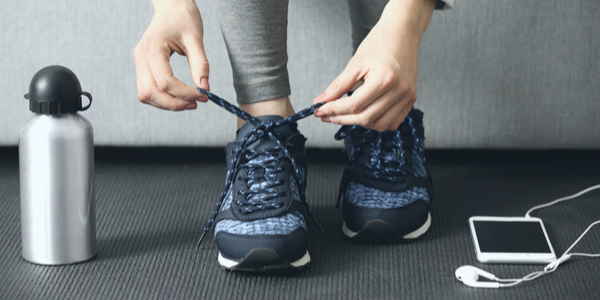
Too much stress can be both physically and emotionally destructive, leading to plummeted energy, sleeplessness, appetite changes, and potential illnesses. In fact, it is estimated between 75 and 90 percent of doctor visits are caused by stress-related illnesses.
Everyone has varying amounts of stress throughout life. While all stress can’t be totally eliminated, it is important to partake in ways to relieve stress. In addition to many other health benefits, exercise is a big part of healthy stress management.
Read on to discover more about how exercise helps stress relief and which exercises can help lower stress the best.
How Does Exercise Reduce Stress?
Exercise can help the body deal with and manage stress by changing the hormone levels in the body and neurotransmitters in the brain controlling mood. Exercise can help elevate the positive feel good hormones and help lower stress hormones.
Research suggests exercise can serve as a mental break from stressful thoughts which is another way exercise benefits stress. How much exercise do you need to help relieve stress? Experts suggest the standard recommended level of exercise, 150 minutes of moderate exercise or 75 minutes of vigorous exercise, can help with lowering stress.
If lack of time or fatigue are part of stress factors, shorter bursts of exercise can still provide stress relief. Getting in 10 to 15 minutes of movement during the day may be more practical than 30 minutes during some stressful situations and can still provide relief.
7 Stress Relieving Exercises
All and any type of exercise can provide stress relief, especially doing a type of exercise you enjoy. However, the following exercises have shown to be especially beneficial for stress relief.
1. Hiking
Hiking is an excellent way to elevate not only heart rate, but mood. In fact, research confirms even just a 50-minute stroll through the woods or nature can lessen anxiety and even improve memory.
Additionally, obtaining ample vitamin D from the sun can combat the risk of various mood disorders, as research from the Vitamin D Council has shown a link between low levels of vitamin D and symptoms of depression.
2. Running
Although the thought of tying up the shoes for a run may not appear too soothing to some, the rhythmic and repetitive movement, “muscular meditation” has actually shown to be quite relaxing.
Moreover, some runners advocate running has helped ward off recurring anxiety and panic attacks with continuous research touting running is an influential exercise to reduce stress. Other examples of rhythmic exercises that can offer the same benefit include brisk walking, swimming, dancing, rowing, and climbing.
3. Yoga
It really is no surprise this practice makes the list, as the benefits of yoga are quite extensive - stress relief included! Yoga can contribute to instant calmness, though practicing regularly can strengthen the relaxation response in day-to-day life.
Tight on time? Try a 20-minute full-body yoga workout routine to offer quick stress relief.
4. Tai Chi
Tai chi not only shows to offer physical benefits, but might encourage the mind-body connection. Fluid, gentle movements can assist in relaxation and relieve stress, while being a safe and low-impact option for people of all ages and fitness levels.
5. Kickboxing
Contrary to the calm practices of yoga and tai chi, kickboxing can be quite aggressive. However, kickboxing is a powerful exercise to reduce stress, involving controlled punching and kicking movements in a muscular meditation rhythm similar to running.
Kickboxing out frustration is an influential way to unleash bottled energy and anger in a well-controlled manner.
6. Martial Arts
Like kickboxing, martial arts offers a physical outlet to release stress and anxiety. And while big bursts of explosive energy are physically beneficial, the movements can help relieve tension and improve mood.
WebMD suggests martial arts can help reduce stress by helping increase focus while staying calm and alert. This practice can translate into stressful life situations when feeling pulled by many things that need your attention.
7. Team Sports
The high activity of team sports, including basketball, soccer, and football, releases endorphins, the body's natural "feel good" hormone. But it is not solely based on playing the sport itself, but getting active with close friends and other team members can help boost and elevate the mood.
The focus of most adult team sports leagues is to have fun not necessarily to win. Therefore, the mood is usually light and can promote camaraderie and fun which helps with stress relief.
Exercise for Stress Relief Recap
Exercise plays an important role in stress relief on top of all the other health benefits exercise offers. Exercise can help regulate stress hormones and increase feel-good hormones. It can also provide an “escape” from thinking about stressors.
Any exercise, or length, can offer stress relief benefits. Specifically, rhythmic exercise outside - like hiking, walking, or running - can further provide the benefits of spending time in nature and getting vitamin D.
Physical activity that targets deep breathing and calming exercises like yoga and tai chi are also top exercises for stress relief. More intense exercises like kickboxing or martial arts can also provide stress relief through more rigorous, methodical movements.
Lastly, team sports can provide light-hearted camaraderie and fun in addition to the stress-relieving health benefits of exercise.
References:
Exercising to relax - harvard health publishing. Harvard Health. Published July 7, 2020. https://www.health.harvard.edu/staying-healthy/exercising-to-relax.
How martial arts can improve your mental health. WebMD. Published October 25, 2021. https://www.webmd.com/mental-health/mental-benefits-of-martial-arts.
Jackson EM. Stress relief: The role of exercise in stress management: ACSM's Health & Fitness Journal. Published 2013. https://journals.lww.com/acsm-healthfitness/fulltext/2013/05000/stress_relief__the_role_of_exercise_in_stress.6.aspx.
Vitamin D and depression. Vitamin D Council. Published February 5, 2018. https://www.vitamindcouncil.org/health-conditions/depression/#.YuE9aHbMJPZ.







